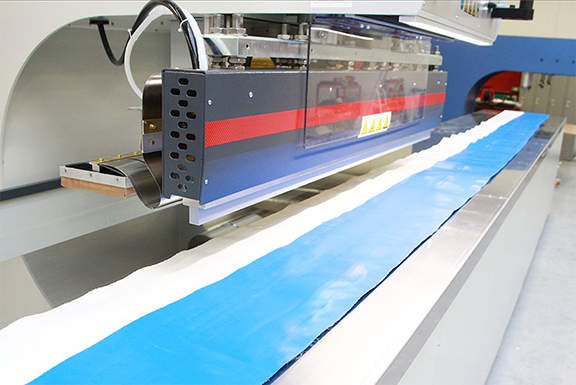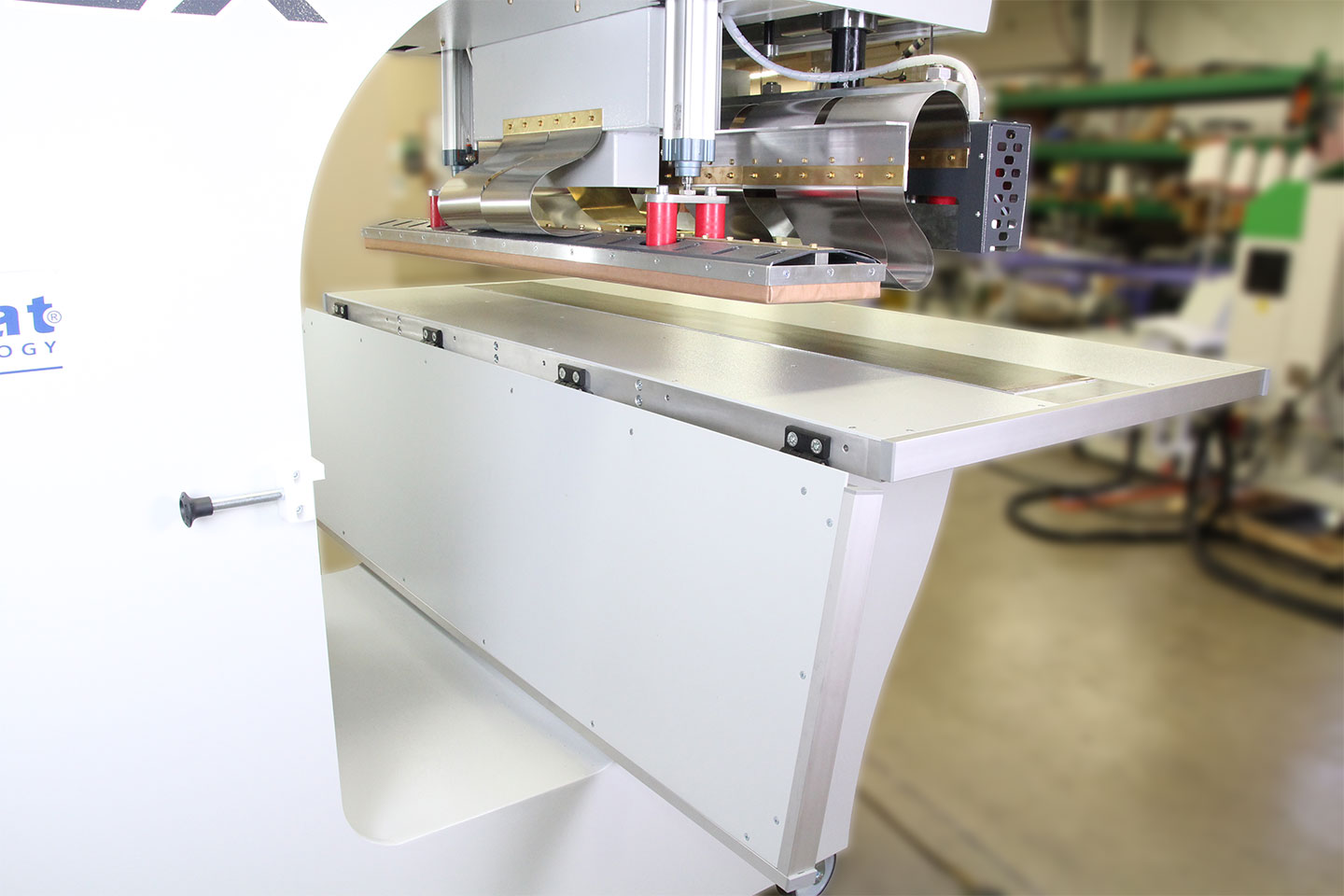In the world of modern manufacturing, achieving robust, high-strength seams is critical for product performance and durability. Industrial RF welding solutions provide an efficient, reliable method for bonding materials, making them an indispensable technology across a wide range of industries. Radio frequency (RF) sealing technology ensures precision and consistency in material bonding, resulting in high-quality products that stand the test of time. Whether you’re sealing PVC, or other thermoplastics, RF welding offers unparalleled advantages in durability and efficiency. Learn more about RF welding technology here.
We’ll explore the fundamentals of RF welding, best practices, applications, and how advanced maintenance tips can keep your equipment running smoothly. Discover how automated RF welding processes and best practices for high-strength seam sealing can revolutionize your operations.
Understanding the Fundamentals of Industrial RF Welding Solutions
What RF Welding Is
At its core, RF welding, also known as high frequency welding, is a process that uses electromagnetic energy to heat and fuse materials. Unlike traditional heat welding methods, RF welding utilizes high-frequency electric fields to generate heat at a molecular level. This results in strong, uniform seams with minimal risk of material degradation.
Materials & Compatibility
RF welding is ideal for materials like PVC, vinyl, and coated fabrics. These materials’ properties make them perfect candidates for RF sealing technology. This process ensures that materials bond seamlessly without compromising structural integrity.
Core Mechanisms
RF welding works through three key mechanisms:
-
Electromagnetic Fields: High-frequency waves excite molecules within the material.
-
Heat Generation: Movement generates heat, softening the material for bonding.
-
Pressure: Applied pressure fuses the materials, creating a strong, uniform seam.
Industry Relevance
From automotive and medical industries to outdoor fabric and packaging applications, RF welding provides consistent, high-quality results. Industrial RF welding solutions ensure manufacturers can meet stringent quality and durability standards.
Choosing the Right Thermoplastic Materials for Your RF Welding Project
Factors to Consider
-
Temperature Thresholds: Ensure materials can withstand the heat generated during RF welding.
-
Material Thickness: Thicker materials may require longer welding times or higher power settings.
-
RF Compatibility: Choose materials specifically designed for RF welding and compatible with the welding machine to avoid uneven bonding.
- Testing Samples: You can send in your materials, and we’ll test them on our machines to ensure they weld properly and meet your requirements.
Common Pitfalls
-
Overheating materials, leading to warping.
-
Uneven seams caused by incorrect pressure settings.
-
Using incompatible materials that fail to bond effectively.
Success Tips
-
Match material properties with appropriate RF welder settings.
-
Conduct test runs to fine-tune parameters before full production.
-
Regularly inspect materials for defects that could compromise seam quality.
Key Safety Measures in Industrial RF Welding Environments
Machine Safety Protocols
Implement lockout/tagout procedures and ensure machines have protective guarding to prevent unauthorized access during operation.
Operator Training
Hands-on training is essential for maintaining weld quality and ensuring safe machine operation. Proper training minimizes risks and enhances productivity.
Maximizing Production with Automated High-Frequency Welding Processes
Automation Benefits with Advanced RF Welding Technology
Automated RF welding processes streamline production, reducing human error and increasing throughput. Automated systems ensure consistent and strong seals through RF heat sealing technology. By eliminating manual interventions, automation ensures consistent seam quality across all product lines.
Scalability
Automated systems adapt easily to varying batch sizes and product types, making them ideal for both small-scale and large-scale operations.
Maintenance and Troubleshooting
Regular maintenance prevents unexpected downtime. Ensuring the efficiency and longevity of RF welders is crucial, as they play a vital role in various industries, including automotive, medical, and aerospace. Inspect electrodes, die plates, and other components periodically to keep machines running at peak performance.
How Automation Enhances Quality Control
-
Real-Time Monitoring: Sensors track key metrics to ensure weld consistency.
-
Minimized Waste: Automation reduces material wastage by eliminating defective seams.
-
Rapid Adjustments: Easily adjust settings to accommodate new materials or designs without significant delays.
Lowering Downtime with Preventive Machine Care
-
Scheduled Inspections: Routine checks prevent costly breakdowns.
-
Parts & Consumables: Replace wear parts like electrodes before they compromise performance.
-
Software Updates: Keep machine software updated to leverage new features and enhance efficiency.

Miller Weldmaster’s Approach to Industrial RF Welding
Company Philosophy
At Miller Weldmaster, innovation and customer satisfaction drive everything we do. Our industrial RF welding solutions are designed to meet the unique demands of each client, ensuring maximum efficiency and reliability.
Customized Systems
We tailor our RF welding equipment to suit diverse industry needs. RF heat sealing offers significant advantages over conventional heat sealing methods, producing strong, leak-proof seals ideal for various industrial applications. From PVC and vinyl welding applications to advanced material bonding methods, our machines deliver precision and performance.
Engineering & Support
Our team of skilled engineers works closely with clients to design systems that address specific challenges. With ongoing support and training, we ensure long-term success.
Tailored Solutions for Complex Manufacturing Challenges
-
Collaborative Development: We partner with clients to develop solutions tailored to their requirements.
-
Advanced Technology: Our machines feature user-friendly interfaces and cutting-edge sensors for optimal performance.
-
Scalable Growth: As production needs evolve, our systems adapt seamlessly to handle increased demand.
Industrial RF welding solutions are transforming industries by providing efficient material bonding methods, high-strength seam sealing, and unparalleled durability. By adopting advanced RF welding technology and best practices, manufacturers can achieve superior results and drive long-term success. Ready to take your operations to the next level? Explore the possibilities with Miller Weldmaster’s RF welding solutions.
Frequently Asked Questions About Industrial RF Welding
Is Industrial RF Welding Right for My Material and Application?
RF welding is ideal for thermoplastics like PVC, vinyl, and coated fabrics. Materials are placed into a welding machine to undergo RF heat sealing, creating strong and durable seals. Consult an expert to determine compatibility.
How Long Does an RF Weld Typically Last?
With proper materials and settings, RF welds are highly durable, often outlasting the product’s lifecycle.
What Support Does Miller Weldmaster Offer After Installation?
We provide comprehensive training, ongoing technical support, and maintenance services to ensure optimal machine performance.
How Does RF Welding Compare to Ultrasonic Welding?
While both methods bond materials without adhesives, RF welding excels in creating larger, high-strength seams and is more suited for thicker materials.
What Are the Size Limitations for RF Welding Projects?
Machine size and electrode dimensions determine the maximum weld size. Custom solutions are available for larger projects.
Do I Need Specialized Training to Operate an RF Welder?
Yes, operator training is crucial for achieving consistent weld quality and ensuring safe machine use.
How Long Does It Take to Achieve a Proper RF Weld?
Most welds are completed in seconds, though specific times depend on material thickness and machine settings.
Is RF Welding Environmentally Friendly?
RF welding eliminates the need for adhesives or solvents, reducing environmental impact and improving sustainability.
How Can I Ensure Consistent Weld Quality Over Time?
Regular maintenance, proper training, and adherence to best practices are key to maintaining quality.
Can I Retrofit an Older Machine with New RF Welding Technology?
Yes, many older machines can be upgraded with modern components to improve performance and efficiency.
What Customization Options Exist for Specialized Applications?
Miller Weldmaster offers tailored solutions, including custom electrodes, automated systems, and advanced controls, to meet unique production needs.




.png)